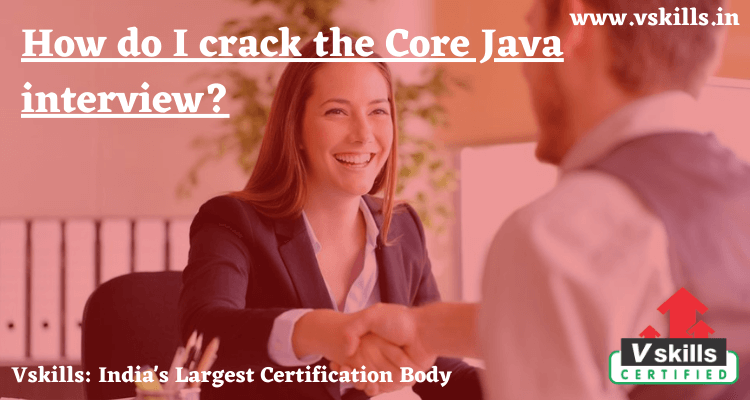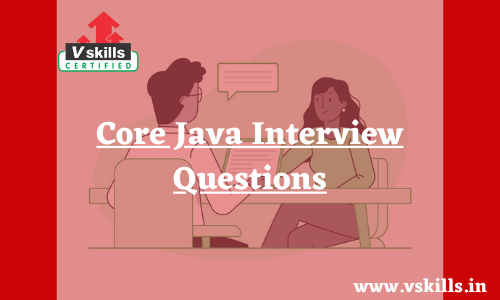Core Java indicates the fundamental foundations of the programming language. It is the part of the Java programming language that is utilized for building or developing a general-purpose application. Moreover, without Core Java, no one can produce any advanced java applications. Further, it practices only one-tier architecture that is why it is named a ‘stand-alone application. Core java programming includes the swings, socket, awt, thread concept, collection object, and classes. Before we start with preparing for the Core Java interview let’s understand some concepts and basics.
Java is a platform-independent and strong programming language. The principle accompanied by Java is WORA that states Write Once, Run Anywhere. Further, the programming language is pretty easy and simple to understand. However, one should understand that Core Java is not distinctive from Java. Java is comprehensive in itself, but for newcomers, it is fundamental that the beginner must start with the core ideas of Java. In reality, Java has several editions, where Core Java is one of the components of an edition. Core Java refers to a collection of libraries rather than just the programming language. It’s the purest form of Java primarily used for the development of general desktop applications. Simply speaking, it refers to the subset of Java SE technologies which consists of both general-purpose APIs and special-purpose APIs. It provides the core functionality of Java with a deep knowledge of the Java language itself.
Skills Needed to Become a Java Developer
- JavaServer Pages (JSP) and servlets
- Web technologies like HTML, CSS, JavaScript, and JQuery
- Object-oriented programming (OOP) concepts and patterns
- Markup languages like XML and JSON
- Service-oriented architecture/web services (SOAP/REST)
- Abstract classes and interfaces
- Constructors
- Exceptions (checked and unchecked)
- Generics
- Java keywords: static, final, volatile, synchronized, transient, this super, etc.
- Java virtual machine (JVM) and memory management
- Multithreading and synchronization
- File IO and serialization
- Dependency injection
- Collections: lists, maps, sets
- Access specifiers
Target Audience
The target audience of this article is the ones who want to become Certified Core Java Developer. Further, this will be very helpful for those who are going to appear for the interview. So, take a seat and read this article carefully.
Core Java Interview
In order to pass the interview, the candidate has to go through the course structure of the entire course. Java Interviews are a concise bit diverse than traditional programming interviews on tech giants and product-based businesses like Google, Amazon, Microsoft, or Facebook. Also, even though it has inquiries from Data Structures and Algorithms like String or Array, the candidate can still succeed to clear Java interviews. The extra essential thing regarding Java interviews is questions are based upon Java programming language and JDK API. In addition, the candidate should know the main knowledge areas such as:
- Firstly, Java Fundamentals
- Secondly, Object-Oriented Concepts
- Also, Data Structure and Algorithms
- Multithreading, concurrency, and thread basics
- Garbage Collection
- In addition, Java Collections Framework
- Additionally, data type conversion and fundamentals
- Array and String
- GOF Design Patterns
- In addition, SOLID design principles
- Abstract class and interface
- Subsequently, java basics like equal and hashcode
- Generics and Enum
- Further, Java IO and NIO
- Common Networking protocols
- Data structure and algorithm in Java
- Furthermore, regular expressions
- JVM internals
- Moreover, Java Best Practices and JDBC
- Date, Time, and Calendar
- XML Processing in Java
- JUnit
- Programming questions
Basic Questions You Should Prepare!
So, here we are providing some common questions which generally appear in such kind of interview. Thus, these are essential questions. Let us get started!
- Explain JDK, JRE and JVM?
- Also, Why Java is not 100% Object-oriented?
- What are wrapper classes in Java?
- Further, What are constructors in Java?
- What is singleton class in Java and how can we make a class singleton?
- Additionally, Explain public static void main(String args[]) in Java?
- What is the difference between equals() and == in Java?
- Further, what is the difference between Array list and vector in Java?
- What are the differences between Heap and Stack Memory in Java?
And, if we specifically talk about the Core Java interview questions, below are some mentioned which you should check out.
- How to create an immutable object in Java? Count all benefits?
- Next, what is the difference between creating String as new() and literal?
- Also, how does substring() inside String works?
- Is Java Pass by Reference or Pass by Value?
- Why HashMap should not be used in a multithreaded environment?
- When do you override hashCode and equals()?
- Why finalize() method should be avoided?
- Why there are two Date classes; one in java.util package and another in java.sql?
- In addition, what is the Marker interface?
- Can it cause an infinite loop as well? Explain abstraction and encapsulation?
- What is the use of the final block?
- Write a Java program to create a deadlock in Java and fix it.
- Is finally block in Java guaranteed to be called? When finally block is NOT called?
- Why main() in java is declared as public static void main?
- Difference between interfaces and abstract classes?
- Then, explain the working of HashMap.
- How are they related? Difference between interfaces and abstract classes?
- In addition, How StringBuffer save the memory?
- Why wait and notify is declared in Object class instead of Thread?
- Moreover, what happens if your Serializable class contains a member which is not serializable?
- How do you fix it?
- Not to mention, explain transient and volatile keywords in java? Difference between Iterator and ListIterator?
Market Demand for the Java Developers
Java has been a leading programming language since its introduction in 1995. It’s a compiled language whose object code isn’t confined to any one processor or computer, making it an excellent choice for cross-platform applications, including web applications and server-side code. Even with competition from new languages, the demand for Java developers remains strong. In fact, Java is among the most in-demand programming languages on the job market, depending on whose numbers you look at.
Job and Salary Prospectus
One of the reasons Java is so popular and the number of open jobs for Java coders staying consistently high is the fact that a number of big companies rely on this programming language for the development of the backend side of their products. For example, here is a list of major tech companies whose products are more or less entirely based on Java: Uber, Airbnb, Linkedin, eBay, Spotify, Square, Groupon, Pinterest. Google still has a high percentage of its development in Java. A number of big Indian software companies, including Infosys, TCS, Wipro, HCL Tech, Myntra, and others are big lovers of Java as well. Global tech giants, like Accenture, Intel, Symantec, Philips, Thomson, T-Mobile are heavy users of Java also.
Well, according to PayScale, the average salary for a Java developer in the U.S. is $74,300 per year, with an average salary range of $50k to $105k per year. Glassdoor’s numbers are even higher at $74,100 per year as an average salary ranging from $57k to $117k per year. As for the demand for Java developers, it stays at a very high level year after year. According to a recent report by analytical company Burning Glass, Java Developer is one of the most common tech occupations in the U.S., with a total number of open job postings nearly reaching 4000 in February 2020 in the U.S. alone. According to Glassdoor, the national average salary for a Java Developer is ₹5,88,927 in India.
Additional Learning Resources
We know that you are very serious about being a Certified Core Java Developer, so here we are providing the programs and resources which should check out! We are starting with the Vskills’s own Certified Core Java Developer course.
After completing the Vskills Certified Core Java Developer course, the candidate will learn how to create solutions to real-world problems in the Java Programming Language. This Vskills certification covers the most essential aspects of Core Java. On the completion of this course, you will have all the basic knowledge that you need to create a functional Java program. Also, Java provides a system for developing application software and deploy it in a cross-platform computing environment. It is used in a variety of computing platforms, from embedded devices & mobile phones to enterprise servers & supercomputers.
Whether you want to become a java developer for major software companies, work freelance, sharpen your programming skills or simply want to bring your ideas to life with a program, this course is definitely for you. Java is one of the most popular computer languages in the world with a huge market advantage. Ideally, the course structure must cover the following exam areas.
- Language Fundamentals
- Also, Object-Oriented Programming
- Exception Handling
- Additionally, Input-Output
- Java.lang
- Further, Collections
- Threads
- AWT and Swings Package
- JDBC
Your Core Java Preparation Guide
Now that we have discussed the details for the Certified Core Java Developer course. Let us get to the learning resources for the Certified Core Java Developer exam so that you can ace the exam.
Online LMS
Vskills Certified Core Java Developer allows candidates to provide themselves with the online learning material for an existence that is updated on regular basis. The e-learning bundled with hard copy material helps to improve and update the learning curve for superior and better opportunities.
Click Here- Sample Material
Certified Core Java Developer VS-1036 Brochure
Vskills Online Tutorials
Certified Core Java Developer Online Tutorial enhances your knowledge and provides a depth understanding of the exam concepts. Additionally, they also cover exam details and policies. Nonetheless, these online tutorials provide and in-depth information related to the examination.
Books for Reference
Reference Books can provide an advantage to learn and understand things more accurately. For the Certified Core Java Developer exam, there are various books available which you can find online or in libraries. Some of the books are as follows:
- Java 9 for Programmers (Deitel Developer Series) by Paul Deitel and Harvey Deitel
- Java: The Complete Reference, Eleventh Edition by Herbert Schildt
- Professional JavaScript for Web Developers by Matt Frisbie
Try Practice Test
Practice tests are the one who ensures the candidate about their preparation. The practice test will help the candidates acknowledge their weak areas to work on them. We at Vskills also offer practice tests which are very helpful for the ones who are preparing.







